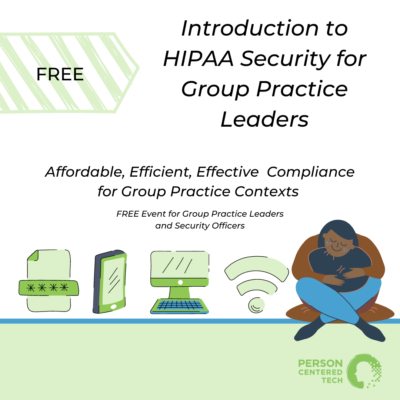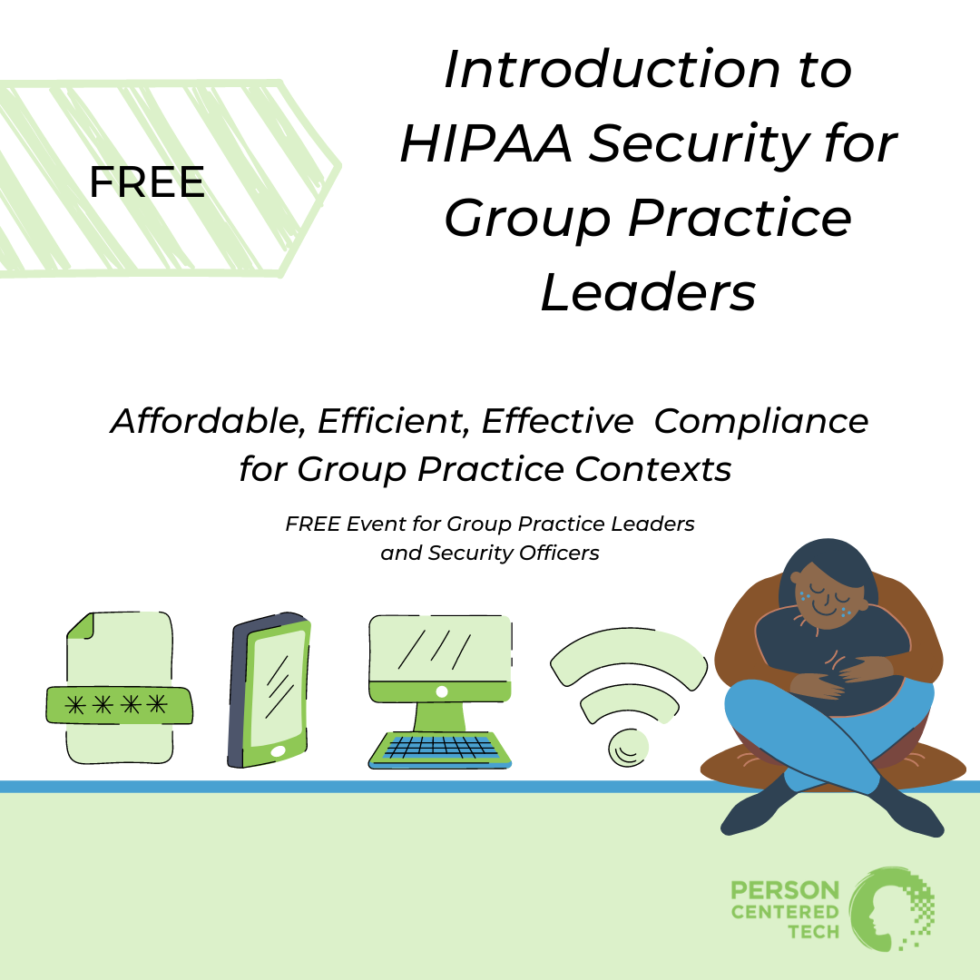Intro to HIPAA Security for Group Practice Leaders
1 CE Credit Hour. Legal-Ethical. Continuing Education Session Replay
Presented By: Roy Huggins, LPC NCC; Liathana Dalton
How is a group of clinicians expected to work within HIPAA?
Fortunately, the process of compliance with HIPAA, and that of maintaining professional ethics around privacy and security, can be broken down into simple steps. In this brief course, we will provide a high-level overview of:
- What HIPAA expects mental health organizations to do for client privacy and security
- How legal-ethical considerations for individual mental health clinicians “bubble up” to the organizational level
- Aspects of HIPAA compliance and ethical behavior that arise for organizations of mental health clinicians, but don’t in solo practices.
- Providing a secure and legal-ethical practice environment which meets the needs of both modern clients and modern clinicians.
- HIPAA compliance boundaries in groups with employee clinicians vs groups with contractor clinicians.
This introductory-level course for group practice leadership and security officers will explore HIPAA compliance in group practice context that supports practice needs, compliance requirements and client care within group practice contexts.
Course Description

Educational Objectives
- Identify what forms of HIPAA Security policies and procedures are necessary for a group practice’s compliance
- Choose an employment structure that supports HIPAA Security compliance
- Identify a training program that can improve client care and reduce risk of liability
Syllabus
- HIPAA Security Compliance Process Overview
- 3-step model of compliance
- Risk analysis
- Risk management and mitigation planning
- Security policies and procedures
- 3-step model of compliance
- Compliance for Group Practices
- How risk differs in a group vs. a solo practice
- Risk “surface area”
- “Bring your own device” and HIPAA compliance
- Security policy and procedure needs in a group vs. a solo practice
- HIPAA Security standards for workforce training and management
- How risk differs in a group vs. a solo practice
- Impact of Employment Law on HIPAA Compliance Strategies
- The eternal question: employees or contractors
- Can the practice enforce its HIPAA Security policies and procedures?
References
- American Counseling Association. (2014). Code of Ethics . Alexandria, VA: Author.
- American Psychological Association. (2010). American Psychological Association Ethical Principles of Psychologists and Code of Conduct . Washington, DC: Author.
- National Association of Social Workers. (2017). Code of Ethics . Washington, DC: Author.
- National Board for Certified Counselors. (2016). Code of Ethics . Greensboro, NC: Author.
- US Dept. of Health and Human Services. (2006). HIPAA Administrative Simplification . Washington, DC: Author.
- US Dept. of Health and Human Services. (2013). HIPAA Omnibus Final Rule . Washington, DC: Author.
Presented/Developed By
 Roy Huggins, LPC NCC, is a counselor in private practice who also directs Person-Centered Tech. Roy worked as a professional Web developer for 7 years before changing paths and makes it his mission to grow clinicians’ understanding of the Internet and other electronic communications mediums for the future of our practices and our professions.
Roy Huggins, LPC NCC, is a counselor in private practice who also directs Person-Centered Tech. Roy worked as a professional Web developer for 7 years before changing paths and makes it his mission to grow clinicians’ understanding of the Internet and other electronic communications mediums for the future of our practices and our professions.
Roy is an adjunct instructor at the Portland State University Counseling program where he teaches Ethics and is a member of the Zur Institute advisory board. He has acted as a subject matter expert on HIPAA, security, and clinical use of technology for Counseling licensure boards, and both state and national mental health professional organizations. He has co-authored or authored 2 book chapters, and he routinely consults with mental health colleagues on ethical and practical issues surrounding tech in clinical practice. He served for 5 years on the board of the Oregon Mental Health Counselors Association and then the Oregon Counseling Association as the Technology Committee Chair.
He really likes this stuff.
 Liath Dalton is PCT’s deputy director and a co-owner. Liath is especially passionate about helping therapists be resourced and supported in navigating the security compliance process and identifying the solutions and processes that meet the particular needs of their practices. Liath’s consultation area of expertise is focused on selecting the right combination of services and tech that not only meet the legal-ethical needs of mental health practices, but also the functionality, efficiency, and cost-effectiveness needs as well.
Liath Dalton is PCT’s deputy director and a co-owner. Liath is especially passionate about helping therapists be resourced and supported in navigating the security compliance process and identifying the solutions and processes that meet the particular needs of their practices. Liath’s consultation area of expertise is focused on selecting the right combination of services and tech that not only meet the legal-ethical needs of mental health practices, but also the functionality, efficiency, and cost-effectiveness needs as well.
Program Notices
Accuracy, Utility, and Risks Statement: The contents of this program are based primarily on publications and reports from the federal Department of Health and Human Services and consultation with experts on HIPAA Security standards and their implementation. Some interpretation and analysis presented is made by the presenter, in consultation with knowledgeable colleagues and expert consultants. Statements about applications to technology are according to presenter’s understanding of the technology at the time of the program. The presenter may not know how to apply all principles discussed to every technology type or product. This program discusses strategies for complying with HIPAA and covered ethics codes, and for improving security. It may not include information on all applicable state laws. Misapplication of the materials, or errors in the materials, could result in security problems, data breaches, or non-compliance with applicable laws or ethics codes.
Conflicts of Interest: None noted
Commercial Support: None
This course is subject to our cancellation/refund policy and complaint policy.

